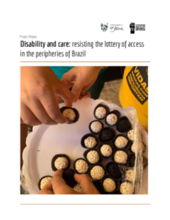This report examines the historical and social context of disability and care in Brazil, with emphasis on the perception of mothers and caregivers, highlighting the deep-rooted inequalities faced by people with disabilities and their mothers, particularly in peripheral areas. Brazil’s history of exclusion, rooted in racist, ableist, and sexist ideologies, continues to marginalize Black people, women, and people with disabilities, with Black and poor women disproportionately assigned care roles.
While various policies exist to support people with disabilities, inadequate care systems persist, exacerbating the oppression of both people with disabilities and women, particularly those responsible for caregiving. Father abandonment is a major issue, placing undue emotional and financial burdens on mothers. Access to information and services for mothers and people with disabilities remains inconsistent, with socioeconomic, educational, geographic, and racial factors determining availability, creating a “lottery of access” to vital support.
This report further highlights the significant barriers to healthcare, social assistance, and education faced by families with children with disabilities, particularly in peripheral areas of Brazil. Diagnosis often relies on binary, biomedical approaches, with long waiting times and bureaucratic hurdles delaying access to disability services and benefits. Post-diagnostic care is limited, leaving mothers without crucial information and emotional support.
Reliance on the public healthcare system (SUS) is linked to poorer health outcomes, while access to private healthcare exacerbates racial and geographic disparities. Additionally, families frequently struggle with a lack of information about their rights and entitlements, and bureaucratic processes often deny or inadequately provide social assistance benefits. Education access is also restricted due to discrimination and a lack of awareness of rights.
In response, community support networks have emerged, offering emotional, practical, and informational support, while some also advocate for systemic change. The report concludes with some policy recommendations.

